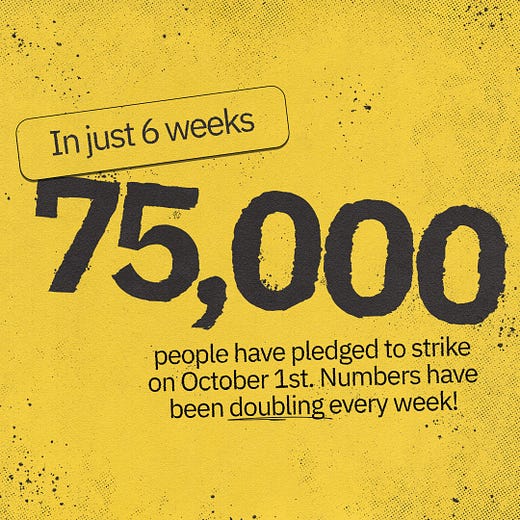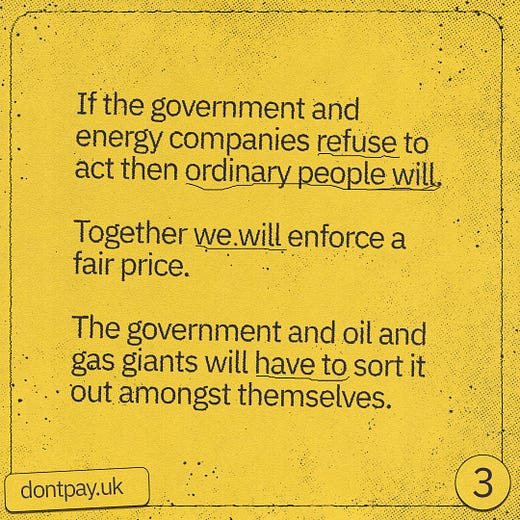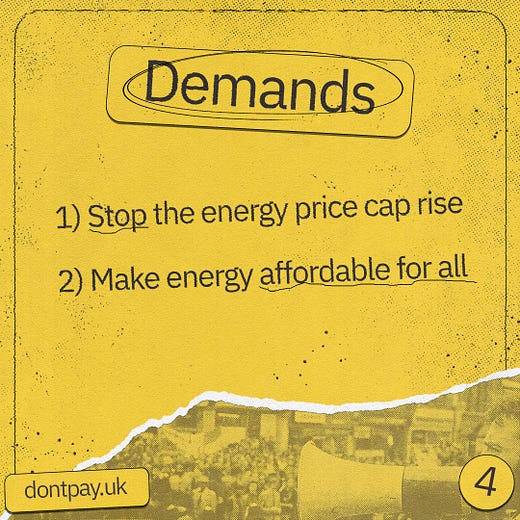Energy prices are projected to skyrocket in Great Britain, and quite a number of Brits are understandably upset about it—so much so they are threatening to simply not pay their energy bills starting in October should the anticipated price rises take place.
The research firm Cornwall Insight predicts the energy price cap is on track to rise to £3,615 a year from January, an increase on its previous estimate of £3,363 made last month.
The cap, which is set quarterly by the energy industry regulator, Ofgem, was at £1,400 a year as recently as October last year.
If that prediction should prove prescient, the average UK household will experience from October onward energy inflation of 158% year-on-year. With the current cap at £1,971 a year, the projected rate hikes are 70-83% just from the current prices.
No wonder the Brits are unhappy—you would be unhappy, too.
Economic Collapse Threatens Political Collapse
We do not need to even look back into history to understand that economic collapse is a likely catalyst for political collapse, and economic chaos a recipe for political chaos. We need only view events in places like Sri Lanka, whose president was recently ousted over Sri Lankans’ anger at that country’s multiple economic crises.
To appreciate the scale of that threat, bear in mind that riots and protests over its bankrupt economy and inability to feed people recently resulted in the collapse of the government of Sri Lanka.
Sri Lankans have taken to the streets for months demanding their leaders resign over an economic crisis that has left the island nation’s 22 million people short of essentials like medicine, food and fuel. After they stormed the presidential palace and other government buildings earlier this month, then-President Gotabaya Rajapaksa, whose family has ruled Sri Lanka for most of the last two decades, fled and resigned.
However, we also have many historical examples to warn of the dangers of economic turmoil to the existing polity. Food riots are largely credited with spurring the “Arab Spring” uprisings of 2010 and 2011 which toppled multiple governments throughout the Middle East.
A more than doubling of energy rates within a single 12-month period might not be total economic collapse, but it certainly sounds like several steps being taken towards it.
The Average Brit Response: “Don’t Pay”
In a move that seems reminiscent of China’s ongoing “mortgage boycott” problem, a number of British citizens have organized a grass-roots movement “Don’t Pay”, which is demanding a reduction in UK energy bills ahead of the planned October rate hike, with the threat of non-payment of bills after October 1 should relief not be forthcoming.
We are a movement against the rise in energy bills
We demand a reduction in energy bills to an affordable level.
We will cancel our direct debits from Oct 1, if we are ignored.
We will take this action if pledges reach 1 million by then.
Don’t Pay has been organizing and advocating for their proposed non-payment campaign for a few months, with their first big event having transpired on June 18th, when they distributed 20,000 leaflets at a trade union demonstration.
We were all very aware of what would be facing us if the hikes in prices continued and the catastrophe of this winter if no one did anything. Using our skills we built a website, designed and printed 20,000 leaflets and handed them out at the “We Demand Better” Trade Union demo in Central London on June 18th. The response was amazing. When we got back to our homes we saw it had taken off on social media and people started signing up and ordering leaflets.
As of August 5th, the group is claiming 75,000 pledges to their non-payment campaign.
Whether their campaign will go truly viral remains to be seen, but certainly there are a number of people on Twitter and elsewhere on social media who are expressing support for the campaign and frustration both over the rising rates as well as the condescending and only marginally effective cost-cutting advice being promoted by British corporate media.
It Has Worked Before
While “Don’t Pay” is still very much in its infancy, this style of economic and political protest has appeared before in Great Britain.
In 1990 and 1991, a non-payment protest movement galvanized opposition to Margaret Thatcher’s capitation tax system, known as a “poll tax”.
The Poll Tax was a flagship policy of the Thatcher government. It had been implemented in Scotland a year earlier and its deployment south of the border was looming, slated for the start of the new tax year the following month. The tax would see the abolition of rates based on the value of a property, replaced by a fixed charge per adult resident and set by each local government. In practice, critics pointed out, that meant a millionaire living alone in a mansion would pay less than the average family, but Thatcher, defending the tax earlier that month in the Commons, argued that it was "a very much fairer system than domestic rates which preceded it", where, "a single person in one house would pay the same rates as four or five people in the next door house."
While the introduction of the tax regime in April of 1990 was met with violent protests culminating in street riots in London, a much more peaceful means of protest emerged in the form of a non-payment campaign: people simply refused to pay the tax, as reported by the BBC in August of 1990:
One in five people in England and Wales had paid nothing towards their community charge - or poll tax - by the end of June, a survey has revealed.
Remarkably, one Labour Member of Parliament, Terry Fields, was even willing to go to jail rather than pay the tax.
The opposition to the poll tax led to a challenge within the Conservative Party of Margaret Thatcher’s leadership, and she ultimately stepped aside as Prime Minister in November of 1990. By March of 1991 the tax was scrapped in favor a new property tax system.
Just last year, a similar non-payment protest movement formed against Southern Water, which had been fined £90M for causing widespread pollution through illegal dumping of untreated sewage. Residents of the county of Kent, where much of the dumping took place, refused to pay their water bills in protest of Southern Water’s illegal dumping. That non-payment movement was supported by noted Irish singer and activist Sir Bob Geldof, who bluntly stated to Kent Online that Southern Water could “**** off”.
He also supported the decision of some residents in Whitstable to make a stand and refuse to pay the waste water portion of their bills.
"Don't pay your water bills to Southern Water, they can **** off," he said.
In February of this year, Southern Water, in an apparent capitulation to the protests, began offering discounts on water bills to a number of the protesters.
Southern Water is offering discounts on bills to some people engaged in a non-payment protest campaign over raw sewage discharges, in an apparent concession to the boycott.
The non-payment protest, which was backed by Sir Bob Geldof, began because of anger at the level of untreated sewage discharged into coastal waters.
Non-payment is a very British mode of protest, and a very effective one.
Is This Time Different?
However, there is one important distinction between prior non-payment movements and that proposed by Don’t Pay. While the 1990 protest targeted a government tax, and the Southern Water protest last year targeted the company’s fine (residents of Kent did not want to “contribute” towards the payment of that fine), the protest being advocated by Don’t Pay is against a service rate levied for the consumption of energy. While energy rates are highly regulated in the UK, the rate rises themselves are still largely a consequence of surging energy inflation worldwide.
In January of this year, an analysis by Deutsche Bank determined that energy inflation was a primary driver of overall consumer price inflation in Germany.
Energy prices were the main driver of consumer price inflation (CPI) in Germany in 2021. The energy price component in German CPI – comprising household energy (electricity, gas, heating oil) as well as petrol and diesel – rose by 10.4% on average last year, contributing more than one percentage point to the annual inflation rate (2020: -0.5 pp).
Here in the US, energy inflation has outpaced consumer price inflation since February of last year.
While the frustration being expressed by Don’t Pay is real, so too are the rising costs of energy, as the rise in natural gas prices in the UK illustrates.
The natural gas and crude oil (the price for Brent crude is also rising) that are the basis for power generation and energy consumption in the UK are commodities for which someone must pay—and the availability of which is being significantly disrupted by a variety of forces, not the least of which is the ongoing Russo-Ukrainian War1.
Merely forcing the British government to lower the price paid by consumers for energy is not going to bring the costs down in real terms.
Still, the crisis facing British households is very real, and without some solution being found very soon this winter is set to be particularly onerous in terms of energy costs.
British households therefore find themselves facing a bleak midwinter given that the cost of living is already spiralling, with inflation now at a 40-year high of 9.1 per cent.
Without financial help, some 2 million more people are forecast to be plunged into fuel poverty this year, meaning 6 million people in total would be struggling to heat and power their homes.
While the Don’t Pay solution of unilateral reductions in consumer energy bills might not be effective or even viable, there is an urgent need for a resolution of some sort before winter arrives.
Chaos Is Coming
While 75,000 pledges to not pay their energy bills come October is a long way from the 1 million pledge goal sought, that 75,000 households in the UK are willing to make such a pledge itself is an indication of the economic stresses being placed on the British polity—stresses which are being felt everywhere.
Energy prices are rising globally.
Food prices have risen sharply from a year ago.
Inflation continues to rise around the world.
Current events and history both teach us that economic turmoil is a precursor to political turmoil. Economic turmoil is the one commodity the world currently has in abundance.
How this turmoil resolves is a tale yet to be told, but until it resolves, both for the UK and the rest of the world, the prognosis is not at all in doubt:
Chaos is coming.
While the Russo-Ukrainian War has definitely pushed energy prices up in recent months, it should also be noted that energy supply constraints were apparent in global markets throughout last fall, long before the war began. The war has made energy price inflation worse, but it is not a primary catalyst of it, as UK energy prices had already increased by 12% as early as last August.















I'm not sure what happens in the Yew-Kay, but I know what will happen here if you don't pay your utility bills for several months in a row...
Hi Peter, another view on this:
https://www.ukcolumn.org/video/uk-column-news-3rd-august-2022
Start the video at 9:42.
It looks like Dominic Cummins might be behind the "Don't Pay movement".